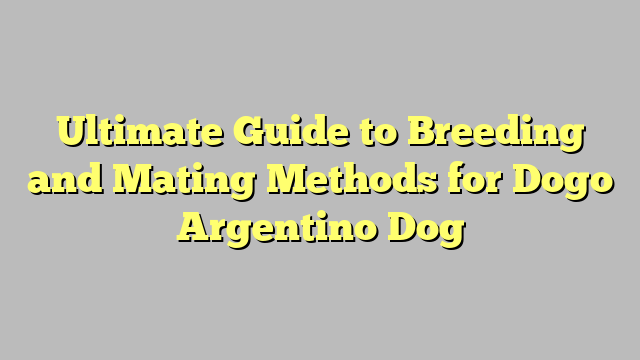
Ultimate Guide: How to Raise Dogo Argentino Puppies Through Each Stage Successfully
Discover the ultimate guide on successfully raising Dogo Argentino puppies through every stage.
Introduction to Dogo Argentino Puppies
Dogo Argentino puppies are known for their loyalty, intelligence, and gentle nature. They are a large breed, originally bred for guarding livestock in Turkey. As puppies, they are curious and playful, with a strong instinct to protect and watch over their family.
Characteristics of Dogo Argentino Puppies
– Dogo Argentino puppies have a distinctive white coat, which helps them blend in with the sheep they are tasked to protect.
– They are independent thinkers and may require patient and consistent training.
– Early socialization is important for Dogo Argentino puppies to ensure they grow up to be well-adjusted and confident adults.
Caring for Dogo Argentino Puppies
– Proper nutrition and regular exercise are essential for the health and well-being of Dogo Argentino puppies.
– Grooming their thick, double coat is important to prevent matting and keep their skin healthy.
– Providing mental stimulation and training from an early age can help channel their natural guardian instincts in a positive way.
By understanding the unique characteristics and needs of Dogo Argentino puppies, you can set them up for a happy and fulfilling life as your loyal companion.
Preparing for a New Dogo Argentino Puppy
When preparing for a new Dogo Argentino puppy, it’s important to create a safe and welcoming environment for your new furry friend. Start by puppy-proofing your home, removing any potential hazards such as small objects, toxic plants, and electrical cords. Set up a comfortable and cozy sleeping area with a soft bed and some toys to keep your puppy entertained.
Socialization and Training
Socialization is key when bringing a new Dogo Argentino puppy into your home. Introduce your puppy to different people, animals, and environments to help them become well-adjusted and confident. Begin basic training early on, focusing on commands like sit, stay, and come. Positive reinforcement and consistency are essential for successful training.
Health and Nutrition
Schedule a visit to the veterinarian to ensure your puppy is up to date on vaccinations and to discuss a suitable diet plan. Choose high-quality puppy food that meets their nutritional needs and provides the right balance of protein, fats, and carbohydrates. Establish a regular grooming routine to keep your puppy clean and healthy.
Preparing for a new Dogo Argentino puppy requires careful planning and consideration, but the love and companionship they bring into your life make it all worth it. By providing a nurturing and supportive environment, you can set the stage for a strong and lasting bond with your new pet.
The Neonatal Stage (0-2 weeks)
During the neonatal stage, which lasts from birth to about 2 weeks of age, puppies are completely dependent on their mother for warmth, food, and stimulation. They are unable to regulate their own body temperature, so it’s crucial for them to stay close to their mother and littermates. At this stage, their eyes and ears are closed, and they are unable to see or hear. They spend the majority of their time sleeping and feeding, and their mother takes care of their hygiene needs by licking them to stimulate urination and defecation.
Key Points:
– Puppies are completely dependent on their mother for warmth, food, and stimulation during the neonatal stage.
– Their eyes and ears are closed, and they are unable to see or hear.
– They spend most of their time sleeping and feeding, and their mother takes care of their hygiene needs.
During the neonatal stage, it’s important to provide the mother with a quiet, warm, and comfortable environment where she can care for her puppies without disturbance. It’s also essential to monitor the puppies for any signs of distress or illness and to ensure that they are gaining weight and thriving. While human intervention should be minimal during this stage, it’s crucial to provide support and assistance to the mother if she is unable to care for her puppies adequately.
Key Points:
– Provide the mother with a quiet, warm, and comfortable environment to care for her puppies.
– Monitor the puppies for signs of distress or illness and ensure they are gaining weight and thriving.
– Provide support and assistance to the mother if necessary, while minimizing human intervention.
The Transitional Stage (2-4 weeks)
During the transitional stage, your Dogo Argentino puppy is starting to become more independent and exploring its surroundings. This is a crucial time for socialization and training. It is important to continue positive reinforcement and gentle guidance to help your puppy adjust to its new environment.
Socialization
Socialization during this stage is vital to ensure your Dogo Argentino dog grows up to be well-adjusted and friendly. Expose your puppy to a variety of people, animals, and environments to help it develop into a confident and well-socialized adult dog.
Training
Basic training should continue during this stage, focusing on commands such as sit, stay, and come. Positive reinforcement and consistency are key to successful training during the transitional stage. Use treats and praise to encourage good behavior and discourage unwanted behaviors.
Healthcare
This is also a good time to establish a regular grooming and healthcare routine for your Dogo Argentino puppy. Schedule veterinary visits for vaccinations and check-ups, and introduce your puppy to grooming tools such as brushes and nail clippers in a gentle and positive manner.
During the transitional stage, it is important to be patient and understanding with your Dogo Argentino puppy as it continues to grow and develop. With proper socialization, training, and healthcare, you can set the foundation for a happy and well-adjusted adult dog.
The Socialization Stage (4-12 weeks)
During the socialization stage, which typically occurs between 4-12 weeks of age, puppies are at a critical developmental period. This is the time when they are most receptive to new experiences and can form positive associations with people, other animals, and the environment around them. It is important to expose your puppy to a wide variety of sights, sounds, smells, and textures during this time to help them grow into well-adjusted and confident adult dogs.
Key elements of socialization:
– Introduce your puppy to different types of people, including children, men, women, and individuals wearing hats or glasses.
– Expose your puppy to various environments such as parks, streets, and different types of flooring (e.g., carpet, tile, grass).
– Allow your puppy to interact with other friendly and vaccinated dogs to learn appropriate social behaviors.
– Familiarize your puppy with common household noises like vacuum cleaners, doorbells, and kitchen appliances.
– Provide positive experiences during vet visits and grooming sessions to reduce anxiety in the future.
During this stage, it is crucial to prioritize positive and gentle interactions with your puppy. Avoid overwhelming them with too many new experiences at once and always ensure that they feel safe and secure. This will help them develop into well-socialized and confident adult dogs.
The Juvenile Stage (3-6 months)
During the juvenile stage, your Dogo Argentino dog will continue to grow rapidly and will be full of energy. It is important to provide plenty of opportunities for exercise and play to help them burn off this energy and prevent destructive behavior. Additionally, this is a crucial time for socialization, so be sure to expose your dog to a variety of people, animals, and environments to help them become well-adjusted adults.
Training
At this stage, it is important to continue with basic obedience training and to introduce more advanced commands. Consistency is key, and positive reinforcement techniques such as treats and praise can be highly effective. It is also important to start addressing any behavioral issues that may arise, such as jumping or mouthing, to prevent them from becoming ingrained habits.
Health and Nutrition
During the juvenile stage, your Dogo Argentino dog will have specific nutritional needs to support their growth and development. It is important to feed them a high-quality, balanced diet and to monitor their weight to prevent obesity. Regular veterinary check-ups and vaccinations are also essential during this stage to ensure your dog remains healthy and happy.
By providing proper training, socialization, and care during the juvenile stage, you can set your Dogo Argentino dog up for a lifetime of happiness and well-being.
The Adolescent Stage (6-18 months)
During the adolescent stage, which typically occurs between 6 to 18 months of age, your Dogo Argentino dog will experience significant physical and behavioral changes. This is a crucial period in your dog’s development, as they transition from puppyhood to adulthood. It is important to provide them with consistent training and socialization during this time to ensure they grow into well-adjusted and obedient adults.
Physical Changes
At this stage, your Dogo Argentino dog will undergo rapid physical growth. Their energy levels may increase, and they may become more active and playful. It is essential to provide them with plenty of exercise and mental stimulation to channel their energy in a positive way. Additionally, you may notice changes in their coat, as they shed their puppy fur and develop their adult coat. Regular grooming and brushing are important to keep their coat healthy and free from mats.
Behavioral Changes
During the adolescent stage, your Dogo Argentino dog may test boundaries and exhibit some challenging behaviors, such as disobedience, stubbornness, and a tendency to wander. It is crucial to remain patient and consistent in your training approach, using positive reinforcement techniques to encourage good behavior. Socialization with other dogs and exposure to various environments can help prevent behavioral issues from developing.
Overall, the adolescent stage is a critical period in your Dogo Argentino dog’s development. By providing them with the necessary training, socialization, and care during this time, you can set the foundation for a well-behaved and well-adjusted adult dog.
Raising Dogo Argentino puppies requires patience, consistency, and proper care at each stage of their development. From socialization to training, understanding their specific needs is crucial for their well-being. With the right approach, these intelligent and loyal dogs can grow into well-behaved and happy companions.







